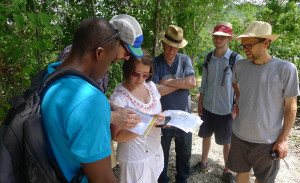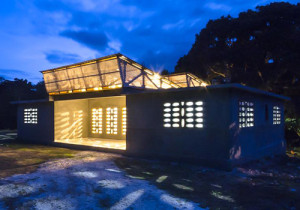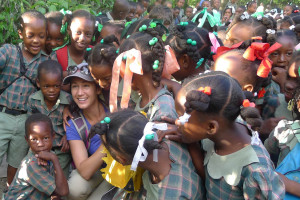June 3, 2014 Design-Build Projects by UT Faculty, Students Continue in Haiti
Students and faculty from the University of Tennessee, Knoxville, College of Architecture and Design went to Haiti this May to continue work on design-build projects, including a guidebook that will address the urgent need for adequate building standards in the country. 
“Our trip this time, the fourteenth,” said John McRae, professor of architecture and lead member of the Haiti Project, “was to check on the status of the school and installation of a donated solar array that was provided by the college through its Solar Decathlon project; to make plans for a new studio project this fall, focusing on early childhood development; and to get feedback on a research project we have been doing, entitled LIFEHouse, a construction user manual for Haiti.”
LIFEHouse will be translated into French, English and Creole, and will be heavily visual to accommodate the low literacy rate in Haiti. It will showcase how Haitians can build secure and healthy homes using local materials and methods.
The book is one of many design-build efforts of the Haiti Project, an initiative launched in response to the massive earthquake that rocked the island nation in 2010. Across three communities, UT has designed a secondary school, a master planning guide, medical facilities, and housing.

Joleen Darragh, a UT architecture lecturer and Haiti Project team member, said she was impressed by how cool the house was despite intense heat. The design really worked to address the climate, she said.
The Haiti Project team also discussed plans for its continuing work with the L’Exode Secondary School in Fond-des-Blancs. During the first phase, students designed the school and the local community built 10 classrooms, a dining hall facility and two sets of restrooms. The second phase will begin soon and include a multipurpose building with administration offices, a library, a dormitory building, and sport facilities. All work to the school is expected to be completed by 2020. 
These additions will accompany new LED lighting and electricity to the campus, which will be run off an array of solar panels that was previously donated to the school by UT. The donation of the solar array was arranged by James Rose, the faculty lead on the UT Living Light Solar House.
“There is no electrical power available in the community except through generators, which is quite expensive.” Darragh said. “The solar array is on the site and operational. It will power the lights for the school and the kitchen heating in the cafeteria.”
In the upcoming semester, a project will emphasize on child care and nutrition research and facilities: “This coming fall a design studio in the College of Architecture and Design will focus on the early childhood development center to include food nutrition and education,” McRae said. “It is anticipated that the class of 15 students will go to Haiti during the fall semester.”
Nearly 60 students across campus have been involved in the Haiti Project in its four-and-a-half years of existence. Based on an immersive multidisciplinary design studio course, the Haiti Project tackles new design-build solutions each semester. Using the expertise of practicing designers and architects on the faculty and the ingenuity and research of students, the Haiti Project is helping to shape the quality of life in Haiti one initiative at a time.
“I have learned architecture extends beyond project scope, space and form, and materials,” said Forrest Reynolds, a recent graduate of UT architecture and engineering. “Architecture is about people – people’s daily lives, families and stories. I feel unique combination of humility and pride knowing the school is changing lives of Haitian children.”
Learn more about the Haiti Project via its UT Impact Big Ideas page at https://tiny.utk.edu/big-impact-haiti
—
C O N T A C T:
Kiki Roeder (865-974-6713, kroeder@utk.edu)
—
R E L A T E D:
“UT Students, Faculty to Continue Design-Build Projects in Haiti During May Trip,” Archinect (28 May 2014)
“UT students help to rebuild Haiti,” DailyBeacon (11 June 2014)
—
P H O T O S P R O V I D E D B Y:


